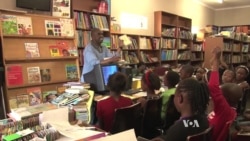Six years ago, riots against foreigners in South Africa resulted in more than 60 deaths. In Johannesburg, hundreds of families found refuge in a Methodist church. Faced with hundreds of children unable to integrate into South African schools, the church opened its own school -- which now boasts more than 300 students.
This classroom is one of the most cosmopolitan in central Johannesburg. Pupils are mostly foreigners from underprivileged backgrounds, coming from countries all over Africa.
The Albert Street school was opened in 2008, following violent attacks against foreigners in South Africa that left many families homeless, and many children, schoolless. Harassed and stigmatized, they could not re-enter regular South African schools.
Six years later, principal William Kandowe said the school is still filling a need. "Even though the xenophobic attacks have a bit subsided, that element of being unwanted is still there, even if you get in some of the places. I experience this with some of the teachers they will tell you I'd rather better work with the people who understand me than the places where they are being segregated," he said.
The school was opened by a Methodist church and runs without government funds and thanks to donations. The instruction is entirely in English and the exams are ones used internationally.
Takunda Maveneka used to live in the streets. He found out about the school from a fellow Zimbabwean. "It was the best experience I ever have. Especially after taking me to people that you don't understand because you speak another language," Maveneka stated. "So when I actually find me friends, these fellow Zimbabweans in South Africa who could understand me, it was like paradise."
But the school is open to all, and also includes South African students. Phosiza Vanga's parents chose it because of the Cambridge international examination system it uses. She didn't know it was mostly attended by foreigners."At first it was very scary. I also had that prejudice against foreigners because of what I heard outside, and what mainly people made them out to be. Like, they make them to be these monsters, that you can't associate yourself with them, so yeah, at first it was scary, but as time went on, I just got used to it and I saw them as brothers and sisters," she said.
And even if the buildings may not look very top-end, the pass rates are. The school says that last year, 100 percent of the students passed their Cambridge Ordinary and Advanced levels exams. School officials say this is due to hard work and also to the fact that the students highly value education.
"Most of them, that's why they are performing very high. Because it's the only way out of the difficult situations," explained teacher Sipiwe Nyamuvuriudza.
But for most of the students, passing their exams is only the first step. The next one will be trying to enter a South African university, or try to find a job in a very competitive job market.






